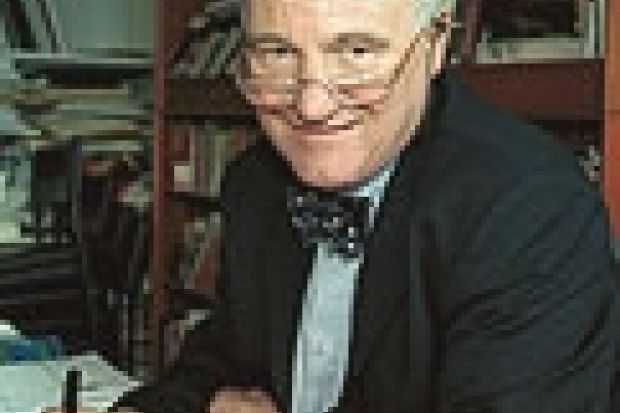With the Teaching Fellowship Awards approaching, one of last year's winners tells Esther Leach how he is spending his £50,000 prize making web learning fun.
Mick Short pulls out a pair of large, white, home-made fairy wings from a brown paper bag. He is trying to explain how stylistics can be fun.
"My co-lecturer usually wears these as the Heineken Fairy during the first lecture," he says showing off the wings.
"There's a wand and a tutu here, too," he adds, looking into the bag.
The fancy dress is part of Short's way of teaching stylistics, a difficult subject in English language and literature.
"My main specialism is stylistic analysis, where I try to understand how readers get from the words on the page to their understanding of texts and how texts affect them.
"The approach is analytical and I have always had to work hard to capture and keep student interest. This led to a 'teaching-and-learning-can-be-fun' strategy to get students hooked on the more intellectual aspects of the work."
The Heineken Fairy makes a point but also sets the scene for the rest of the course at Lancaster University, where Short has studied and taught for 30 years.
Lancaster has one of the biggest linguistics department in Britain, with 60 or 70 students on the stylistics course. "My interest is in the interface between linguistic study and literary study and I don't think there is anywhere better in the world to do it. My colleagues in this area are very good, we get on very well," he says.
Although Short expects students to work hard, study does not have to be dull, he says.
The same fun theory applies to his latest project. Short was one of the first batch of 20 lecturers to win a £50,000 fellowship from the Institute for Learning and Teaching last year and he is using the money on a project to harness technology for his work.
Short was already videoing lectures and workshops and making them available in the department to students to "revisit" or catch up if they had been ill. He was also experimenting with email discussion groups.
Now, with research assistant Dawn Archer, whom the award has helped him employ, he is creating a web version of the stylistics course, which, if successful, he hopes will be available free to all worldwide, copyrights permitting.
The web course is having a pilot run at Lancaster from January to March 2002 and the 2002-03 academic year, when it is expected that other universities at home and abroad will replicate the experiment and report on results.
"The experiment cannot be an entirely clean one as there are lots of variables but the idea of replicating it elsewhere at least allows us to see the similarities," Short says. "I want to have one group of students at Lancaster doing it in lecture-seminar format and the other students volunteering to do it in web-based format, so that we can then see which they like best and which they appear to do best on."
The reactions of the student groups will be compared using questionnaires, interviews and focus group meetings at the beginning, middle and end of the course.
Short says that when he first began looking at using the web for stylistics teaching and learning, "I found most of the stuff I came across was just great chunks of text dumped on the computer. People tended to put their lecture notes on screen, which seemed pretty uninventive.
"Because I've got an all-singing and all-dancing lecture-seminar course, somehow or other I've got to have the equivalent to that on the web, otherwise I am not comparing like with like when I carry out the experiment."
Eventually the web course will involve a range of interactive tasks, animated graphics and "click-ons", such as links to relevant parts of texts or paintings, voice recordings of extracts that are being subjected to phonetic and rhythmic analysis and video clips of dramatic extracts and lecture clips.
Short hopes it will be possible for students to learn in more detail about a particular stylistic, linguistic or psychological theory or analytical skill.
"Students can do practice analyses at different stages, mark themselves and then tell the computer how well they think they have done and what mark they deserve. The computer will give them back a relevant piece of work marked to that level," says Short.
"I hope the material will be of relevance to all in the humanities and social sciences and those teaching advanced English abroad who are interested in developing web-based learning packages, particularly those wishing to develop students' analytical skills," he adds.
"The difficulty is that you can be a bit more Heath Robinson in a lecture and get away with it more than you can on a computer screen, so that's something we are thinking about. What we don't want is screeds of reading and nothing else."
And then where is the Heineken Fairy?
"Oh, I think she only has to wave her magic wand and she'll be in cyberspace. But I'm not so sure about virtual beer."
Register to continue
Why register?
- Registration is free and only takes a moment
- Once registered, you can read 3 articles a month
- Sign up for our newsletter
Subscribe
Or subscribe for unlimited access to:
- Unlimited access to news, views, insights & reviews
- Digital editions
- Digital access to THE’s university and college rankings analysis
Already registered or a current subscriber?
